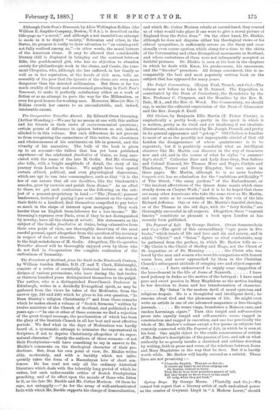The Preachers of Scotland, from the Sixth to the Nineteenth
Century, by William Garden Blaikie, D.D. (T. and T. Clark, Edinburgh), consists of a series of essentially historical lectures on Scotch divines of various persuasions, who have during the last twelve or thirteen hundred years distinguished themselves in the pulpit. The author, who is a distinguished Free-Church Professor in Edinburgh, writes in a decidedly Evangelical spirit, as may be gathered from the views he takes of the Moderates, from the answer (pp. 245 and 246) which he gives to his own question, "Is Dean Stanley's religion Christianity P" and from these remarks which he makes about a volume of "Scotch Sermons," written by twelve ministers of the Church of Scotland, and published a few years ago :—" In one or other of these sermons we find a rejection of the great Gospel message, the proclamation of which has been the glory of the Scottish Church in all her best and most effective periods. We find what in the days of Moderatism was hardly heard of, a systematic attempt to minimise the supernatural in Scripture, if not to deprive Christianity altogether of its super- natural character." Surely the authors of these sermons—if not their Presbyteries—will have something to say in answer to Dr. Blaikie's comments on the theological character of their pro- ductions. But, from his own point of view, Dr. Blaikie writes ably, moderately, and with a lucidity which not infre- quently takes the form of a Macaulayan love of short sen- tences. He has read not only all the ordinary historical literature which deals with the tolerably long period of which he writes, but such unfavourable critics of Scotch Presbyterian preaching, and of its effect upon the morale of those who listen to it, as the late Mr. Buckle and Mr. Cotter Morison. Of them he says, not unhappily :—" As for the array of well-authenticated facts with which Mr. Buckle supports his charge of demoralisation,
and which Mr. Cotter Morison retails at second-hand, they remind us of what would take place if one were to give a moral picture of England from the Police News." On the other hand, Dr. Blaikie, although he does not disguise either his theological views or his ethical sympathies, is sufficiently severe on the fussy and occa- sionally even coarse egotism which clung for a time to the skirts of the Covenanting and other Evangelical movements in Scotland, and whose caricatures of them were not infrequently [incepted as faithful pictures. Dr. Blaikie is seen at his best in the chapters in which he deals with Knox, his predecessors, his successors, and the "Seceder" preachers. All things considered, this is in- comparably the best and most popularly written book on the subject that has appeared for many years.


































 Previous page
Previous page